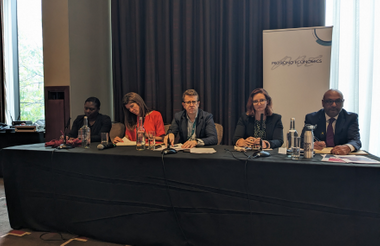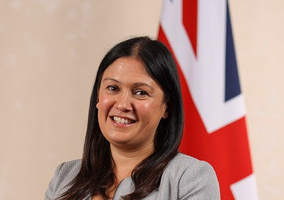A new agreement between the government and charity sector to improve relationships and understanding between the two is set to be published “in the new year”, NCVO’s chief executive has said.
Speaking at a fringe event at the Labour Party conference yesterday, NCVO’s CEO Sarah Elliott said there had been “a real desire” from the government to work with the sector since the general election.
She said NCVO and fellow sector body ACEVO were “very actively working on” developing a new agreement that would be “akin to the Compact”, which was introduced in 1998 to ensure effective partnership between the government and civil society organisations in England.
Elliott said the new agreement, called a “covenant”, would be different to the Compact and launch “in the new year”.
Starmer partnership pledge ‘not just warm words’
Elliott began by quoting Keir Starmer’s speech in January, in which he committed to resetting the government’s relationship with the sector if Labour won the election.
“We were all feeling great, we came away feeling very warm and fuzzy about that, but I guess there was a little bit of scepticism,” she said.
“We can be a bit sceptical in the voluntary sector, probably rightly so, that maybe that wouldn’t follow through in government.
“My experience so far is that they weren’t just warm words.
“There’s a real desire right from the heart of government to work with the voluntary sector, and rightly so, because mission-led government aligns a lot with what we across the voluntary sector are trying to achieve and there’s a lot we’ve got to offer.”
New agreement between government and charities
Elliott said that a few weeks into the new government, Downing Street chief of staff Sue Gray wanted to talk to her.
“If you think about it, we’re quite used to government talking to the trade bodies in the private sector, but we certainly struggled with previous governments,” she said.
“It was at the time of the riots, which obviously were awful, across the summer, but they very quickly recognised, right at the top of Number 10, that they needed the voluntary sector to help them, and also to recognise the work that was going on on the ground with the voluntary sector.”
She also described meeting culture secretary Lisa Nandy within a couple of weeks of her taking office, compared to two engagements in four years with her predecessor.
“[It’s] very telling that she’s got a very broad brief and wanted to meet some of the conveners of the voluntary sector very quickly,” said Elliott.
“One of the things that we’re very actively working on at the moment, my team and Roberta [Fusco] in the ACEVO team as well, is trying to develop something a bit akin to the Compact.
“For those of you remember, in the early 2000s the Compact between the voluntary sector and government [set out] how we wanted to work together. My critique of that was it was used as a stick to beat each other with.
“So, we’re trying to look at it from a different angle this time, and how it can actually look at the strengths that government brings to the table and the strength that civil society brings to the table so together, we can serve people in communities.
“Nandy is calling that ‘covenant’. I’m glad it’s got a new name because I don’t think we want it to be a replica of the Compact, and so we hope to be able to launch that in the new year.”
Civil society not yet ‘a top priority’
Also speaking on the panel, Nicole Sykes, director of research, policy and communications at Pro Bono Economics, agreed that the new government is “definitely warmer” than its predecessor.
Sykes said charities have a lot of potential ministerial “champions” because there is “so much strong understanding of the charity sector”.
However, she added: “I don’t think it’s anyone’s top priority, that’s my real concern.
“The thing I worry about the most is, what does it take to make it a top priority? Is it the Carillion of the charity sector — is that the only thing that’s going to make them sit up and think: ‘Actually, I want to fix this.’ We have to not get there.
“The charity sector is very good at keeping going. We’ll adapt and make sure that we’re supporting the people who need us.”
She said recent closures of some smaller charities had not led ministers to see it as “a systemic problem” and something that needs to be acted upon.
“I don’t want it to get there but there’s that worry of is that what it’s going to take?” she said.
“Because you know you relied on us a lot during the pandemic, you know you relied on us a lot during the cost of living. If that’s not enough, is it that grim?”
Related articles











